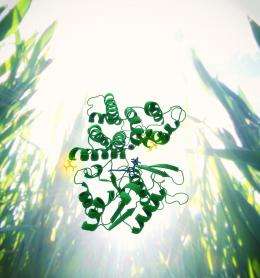Single microbial gene linked to increased ethanol tolerance

(PhysOrg.com) -- A team of researchers from the Department of Energy's BioEnergy Science Center has pinpointed a single, key gene in a microbe that could help streamline the production of biofuels from non-food sources.
Led by Steven Brown of DOE's Oak Ridge National Laboratory, the team identified a key gene responsible for ethanol tolerance in Clostridium thermocellum, a microorganism under consideration for use in a new biofuel production technique called consolidated bioprocessing, or CBP.
Current methods to make renewable biofuels from lignocellulosic biomass -- switchgrass or agricultural waste, for example -- require the addition of expensive enzymes to break down raw materials. In a more streamlined approach, CBP uses microorganisms that produce their own enzymes to liberate the plant's sugars and ferment them into ethanol.
"We want the microbe to make more lignocellulosic ethanol, so we're trying to understand the genetic basis behind the process," Brown said. "If we can evolve the strain to be more tolerant to ethanol, the hope is that we could make higher concentrations of ethanol, which would lower biofuel production costs."
Although scientists have studied the C. thermocellum microbe for decades, the genetic basis for its ability to tolerate higher concentrations of ethanol had not been determined. Earlier studies indicated that multiple genes, instead of a single allele, likely caused ethanol tolerance.
"Our results were really unexpected," Brown said. "It was deemed very unlikely to be a single gene because it's such a complex trait."
The BESC team located the single gene by sequencing the genomes of two types of C. thermocellum -- a wild-type strain as a reference and an ethanol-adapted strain. The researchers singled out a mutated gene in the ethanol-adapted strain called alcohol dehydrogenase, the final protein in the microbe's pathway for making ethanol.
"When we put this particular copy of the adhE gene into the wild type strain, we were able to generate the mutant phenotype with just this one gene," Brown said.
Further analysis including protein structural modeling provided a more complete picture of the mutant gene.
"It's a very comprehensive study," said Paul Gilna, director of BESC. "Rather than have just one technique or one approach, we were able to draw upon multiple experts within their fields to contribute a broader set of analyses. It is a great example of how a center such as BESC can apply expertise from multiple disciplines to bear on research questions such as this."
More information: The team's results were published in the Proceedings of the National Academy of Sciences as "Mutant alcohol dehydrogenase leads to improved ethanol tolerance in Clostridium thermocellum." The invention is available for licensing.
Provided by Oak Ridge National Laboratory
















